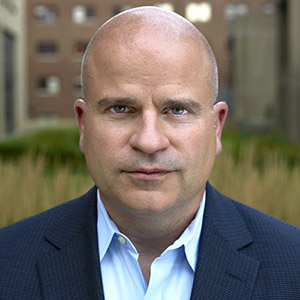The School of Public Health has launched a reimagined center devoted to developing and improving ways for people to be happier and healthier as they age. The new Center for Healthy Aging and Innovation (CHAI) seeks to foster interdisciplinary, community-engaged approaches to support students, researchers, and the community when addressing critical issues related to aging.

“CHAI is a place that all Minnesotans can contact to get information and resources related to aging and caring for older people,” says the center’s director, Professor Joseph Gaugler. “CHAI will also be an open channel for policymakers who want to partner with the University and school to create legislation and programs to support our aging populations.”
CHAI‘s immediate goals are to address issues related to dementia care and support; the state of geriatric workforce; safety in long-term care; and quality and equity in long-term services and supports.
CHAI emerged from the school’s previous Center on Aging. The earlier center was founded by former Professor Robert Kane and raised awareness across the University for the need to scientifically study aging.
“Today, a main objective of CHAI is to provide activities, services, and engagement to benefit faculty, students and staff at the University,” says Gaugler. “It will also be an outward facing center to effectively partner with key stakeholders across Minnesota.”
Gaugler wants CHAI to be accessible to everyone and is structuring the center around three core areas: research, education, and equity/community engagement.
Research
CHAI aims to provide center members with support and collaboration to help advance their own programs of interest in aging. Research initiatives include:
- The Aging Work Group, where members can discuss their research, solicit feedback on proposals, and develop collaborations to jumpstart their studies of aging.
- Offering the Fesler-Lampert Chair in Aging Studies that annually names a new professor and provides them with funds to pursue their research.
- Developing seminars, podcasts, networking events, pilot funding, and other activities to build research capacity in aging science and inform the research community.
Education
CHAI strives to create meaningful and immersive educational experiences in aging. Educational initiatives include:
- Relaunching an interdisciplinary graduate minor in gerontology and aging studies.
- Developing an aging studies certificate for professionals.
- Forming the Aging Studies Interdisciplinary Graduate Group, which allows graduate students across the University to gather to create a community of interest related to aging.
- Establishing the University of Minnesota as the first college or university in Minnesota internationally-recognized as an age-friendly university.
Equity/Community Engagement
CHAI intends to build and sustain innovations in care and services by establishing vibrant community, governmental, business, and individual collaborations. Examples of such innovations include:
- Empowering an associate director of equity and community engagement to serve as an engaged liaison between the center and its community partners.
- Creating formal partnerships with key external stakeholders, such as the Minnesota Gerontological Society, the Diverse Elders Coalition, the Homecare Providers of Minnesota and others.
- Establishing a community advisory board to guide and link members of the center with community partners.

The center’s associate director for research is Associate Professor Tetyana Shippee. Shippee was a member of the former Center on Aging and partnered with Gaugler in envisioning CHAI.
“I’m especially excited about the possibility for new opportunities to create and engage in new topics in aging science, collaborate with other researchers on grant proposals, and offer professional development for scholars doing aging- related research,” says Shippee.
CHAI is already hosting events and connecting with the community, including holding a forum on long-term care financing in Minnesota this past January and has plans to conduct an assembly on aging this December to determine the center’s future plans. The center was also instrumental in forming the school’s new Public Health Center of Excellence on Dementia Caregiving.
Faculty, students, and members of the community who are interested in becoming involved in CHAI can call 612-626-9535 or visit the center’s website for more information. Members of the public are also welcome to contact the center for help with elder care and aging-related issues.

